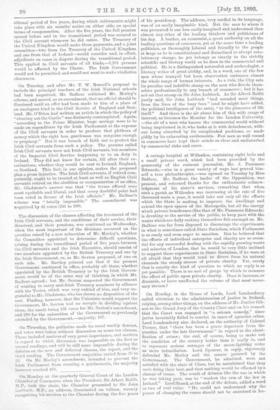On Monday, at the quarterly General Court of the London
Chamber of Commerce, when the President, Sir Albert Rollit, M.P., took the chair, the Chamber presented to Sir John Lubbock, M.P., an address, illuminated on vellum, warmly recognising his services to the Chamber during the five years of his presidency. The address, very cordial in its language, was of an easily imaginable kind. But the man 0 whom it was presented is one leas easily imagined and understood than almost any other of the leading thinkers and politicians of his day. A banker, an economist, a great authority on all the leading questions of commerce, yet at the same time a leading politician, as thoroughly Liberal and friendly to the people at large as he is constitutional and disinclined to abrupt revo- lutionary change, he yet belongs as clearly to the strictly scientific and literary world as he does to the commercial and political. He is a distinguished naturalist and archaeologist, a literary writer of great ability, and, in a word, one of the few men whose tranquil but keen observation embraces almost the whole range of human interests. As a rule, the City sets its peculiar and indelible stamp on the men who devote them- selves professionally to any branch of commerce ; but it has not set that stamp on Sir John Lubbock. As Sir Albert Rollit justly said, Sir John Lubbock "had sounded most things, from the lives of the busy bees" (and he might have added, the political intelligence of the ants), "to the pleasures of life itself." And there is the air about him of this wide range of interest, as becomes the Member for the London University, —the air of a man who knows the commercial world without being imprisoned in it, who looks at it with detachment, with- out being absorbed by its complicated problems, or made giddy by its exhausting excitements. Few men so well versed in commerce have kept their minds so clear and undisturbed by commercial risks and cares.


































 Previous page
Previous page